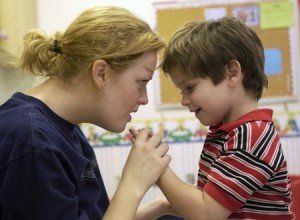Autism is a syndrome that affects both children and adults. It will begin in very early childhood from infancy to less than three. Signs and symptoms of autism will be visible in three different areas of the child’s life – social development, language skills and behavior.
Children and adults with autism will often exhibit ritualistic behaviors that therapists believe are calming to the individual.
Individuals with other disabilities, such as OCD or blindness, will also exhibit ritual behaviors that help to calm the individual and make the environment more familiar to them.
Data suggests that the basal ganglia and frontal lobes of the brain are responsible for the development of repetitive behaviors.
Autism and OCD
There is also evidence from psychopharmacological studies that suggests there is an overlap in the neuropathology of autism and OCD.
In studies that have attempted to compare the development of ritualistic behaviors in people who suffer either from autism or OCD have found that while these behaviors are similar in early development of the processes over time they become less similar or serve a different function in these two populations. This research has helped to further define treatment protocols that may or may not work in children and adults with autism.
Physical and Mental Development
Although children with autism will appear to have normal physical development with good muscle tone they will also exhibit repetitive and ritualistic behavior that may also be called stereotypical movement disorder.
Another common term is self-stimulation or ‘stimming’. These motions are called this because the constant motion will stimulate the brain in a way that the individual finds comforting.
Autism Theories and Behaviors
There are several theories about what these behaviors serve and the reasons for the increased incidence in people who suffer from autism. One theory is that the nervous system is under-stimulated and these behaviors serve to increase the stimulation of the nervous system.
Others theorizes that the nervous system that is over stimulated will find these movements normalizing.
Some of these typical examples are teeth grinding, hand waving or flapping, rocking movements, and nail biting. In some instances this self-stimulating or ritualistic behaviors can be damaging and injure the individual. These behaviors may include head banging, self-biting or picking at the skin.
These ritualistic behaviors can be extreme or may be more subtle. Individuals may spend a lot of time flapping their arms or wiggling their toes or they may suddenly freeze in position. Another ritualistic behavior can involve language. In this case it is called echolalia which is the repetition of a single word or phrase. This can be a constant repetition or it may be a specific number of times done at a specific time of the day.
Determining Therapy
In cases where the ritualistic behavior is subtle and doesn’t cause injury to the individual or bystanders they may be ignored. However, in some cases these behaviors may be causing injury or be so severe that they interfere with the individual’s ability to interact with his environment in the best way they are able.
In these cases the ritualistic behavior may be addressed through Applied Behavioral Analysis, Sensory Stimulation Therapy or medication depending upon the theorized cause behind the behavior.
Ritualistic behaviors are often a part of the diagnosis of autism and something that individuals and parents must learn to cope with. By helping the individual to learn coping strategies and the parents to help the child most children with mild to moderate autism are able to function in society without additional stress.
Natural Remedies Can Help Ritualistic Behavior
MindSoothe Jr. is a natural, safe, effective specially formulated herbal remedy that has been successfully used in the treatment of child and teen Depression, Insomnia, OCD, Panic Disorder, and Anxiety. Being natural, with no artificial preservatives, this remedy is safe for children and teens, is non-addictive and has NO SIDE EFFECTS.
It has become the formula of choice by thousands of satisfied customers around the world for treating depression, insomnia, anxiety, and more. MindSoothe Jr. is pharmaceutically manufactured to the highest standards and was formulated by our team of experts in natural medicine.
Learn more about MindSoothe Jr. now.
Why do we promote this?


 Fill out the form below to sign up to our free natural health and healing newsletter and stay up to date on our latest articles about holistic healing therapies and effective home remedies for common ailments. As a thank you for joining our newsletter, we’ll also send you
Fill out the form below to sign up to our free natural health and healing newsletter and stay up to date on our latest articles about holistic healing therapies and effective home remedies for common ailments. As a thank you for joining our newsletter, we’ll also send you
I had a friend with a son that is autistic. It was very hard for her to figure out how to deal with his issues. I know that she tried to do a lot of things to help him, like cutting out dairy and stuff. I know some people actually cut out gluten in their autistic children also. Thanks for writing such good information about this condition.